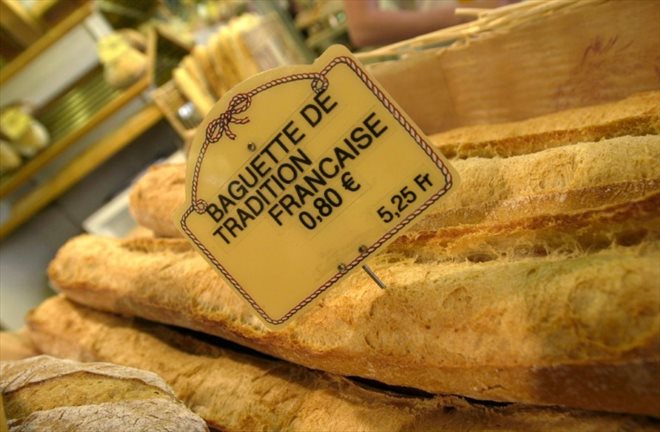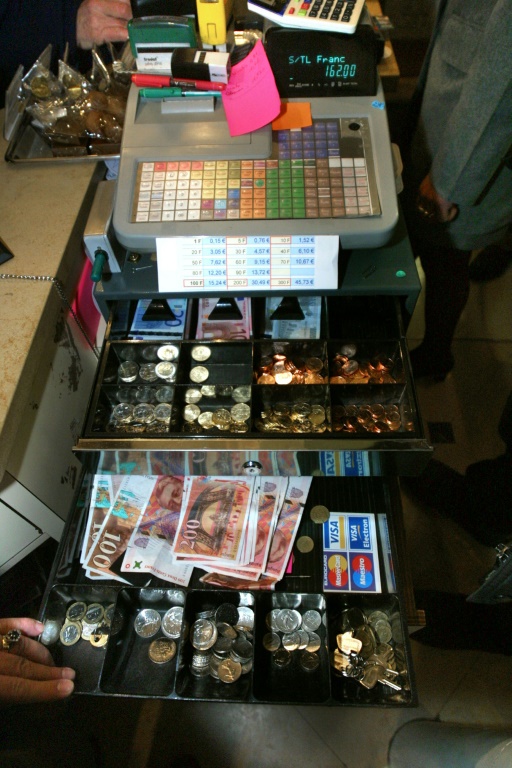EURO 2002-FRANCE (AFP / PHILIPPE DESMAZES)
Goodbye francs, lire, marks, pesetas: on January 1, 2002, three years after its official birth, the inhabitants of twelve European countries can finally hold the euro in their hands.
Back on the first days of this great historical leap, between euphoria and reluctance, thanks to the AFP archives.
“Coffee, croissant, baguette and flowers: the French inaugurated the euro in small shops with a lot of curiosity,” said a morning dispatch on January 1.
“Certain revelers, in particular, made withdrawing euros one of the attractions of their New Year’s Eve” to feel the new currency without waiting: 450,000 withdrawals took place during the night at cash machines.
In front of one of these machines, a woman observes her note: “I’ve been waiting for this for a year, we can finally touch them”. “Anyway, we have no choice,” comments a stoic passer-by.
– “Currency of barbarians” –
For the first expenditure in “concrete” euros, small open traders are in the front line on this holiday. And try to comply with the obligation to give as much change as possible in euros, even when they are paid in francs, still accepted for a few weeks.
Gare de l’Est, a teller arms herself with patience in front of customers loaded with old yellow coins. “I’m trying to collect ten francs in grape to get rid of it because my baker doesn’t want it anymore”, explains one of them.
The following days, change of scale: activity resumes, large businesses join in the dance.

COMMERCE-EURO (AFP / MYCHELE DANIAU)
“The pieces are all alike,” complains an employee of an Irish clothing chain in Dublin. “And they should give up the smaller one, the penny, which is ridiculous.”
All is going well in Athens, where AFP tells of a changeover to the euro “in a good mood”.
With some exceptions: in the central market, a popular bastion located at the foot of the Acropolis, the drachma continues to reign in trade on January 3. “Their barbarian currency, let them keep it”, thunders a butcher.
In Italy, where the government of Silvio Berlusconi is tearing itself apart over the new single currency, queues are lengthening in banks, post offices and in front of station ticket offices. Police are called in when the going gets tough.
In Naples, an “SOS euro” toll-free number has been set up to report errors and abuses in conversions, of which Italian consumers complain.
– Proof of the Big Mac –
Certain price adjustments from above do not go unnoticed.
As in the Vatican, where the “papal blessing” on parchment goes from 5,000 lire to 3 euros, an increase of 0.46 euros. The Vatican Museums and the visit to the dome of St. Peter’s Basilica are also getting more expensive.
In Spain, many shops selling “everything for 100 pesetas” (0.60 euros) switch to “everything for one euro”.
In most of the twelve countries, stories of exaggerated “rounding” are on the increase. But “no generalized price slippage has been observed”, assures the European Commission.
The president of the European Central Bank (ECB), the Dutchman Wim Duisenberg, is doing it his part to convince: “When I bought a Big Mac this week, accompanied it is true by a strawberry milkshake, that to me. cost 4.45 euros, which is exactly the price I paid for the same meal in German marks “before the change of currency.
In France, the customer of a bar in the city center of Auch protected himself in his own way against any increase: a waiter realized, a little late, that he had paid for his consumption with a ticket. 5 euro dummy from a Monopoly game.
– Shortages –
At the end of this first week, the main problem is that of shortages of parts and small denominations, noted in several countries.
In the Netherlands, a model student of the passage of transactions in euros, supermarkets and gas stations, short of small change, decide after a few days to give change again in guilders.
The Spaniards are called upon not to hoard euros to avoid the looming shortages.

EURO-2002-CASE (AFP / DANIEL JANIN)
In France, the government is surprised by “the haste of the French to get rid of all their francs in a few days”, including the large bills “hidden under the mattress” or the “coins taken out of children’s piggy banks”.
In order not to seize the system, the banking authorities ask the French not to buy “their baguette with a 500 franc note”.
Despite these difficulties, the first steps of euro coins and banknotes for more than 300 million Europeans are widely hailed as a success.
“Even the legendary attachment of the Germans to their Deutschmark” did not resist the movement, reports AFP on January 5.
“I am convinced that January 1, 2002 will remain in the history books in all our countries as the start of a new era in Europe”, enthuses Wim Duisenberg, nicknamed “the father of the euro”.
© 2021 AFP
Did you like this article ? Share it with your friends with the buttons below.




